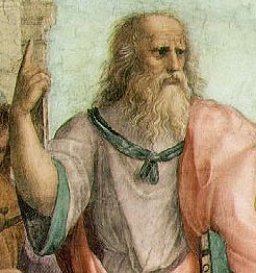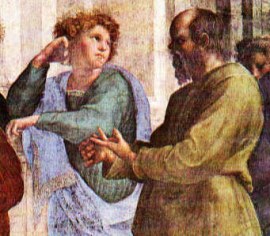Love. It’s wonderful and hurtful and kind and messy. An ounce of it can chuck logic out the window and drop you in a whirlwind of emotions, words, thoughts, worries…
How do you know when it is truly love? When it is the kind of love worth gambling on? Is it love or lust, a temporary fling or something with a firm foundation?
Well, I look to Plato. No joke.
A professor introduced me to Plato’s Symposium a while ago, and I have used it as a reference, as a rock in the storm, if you will, during the tides of each relationship since. There is something beautifully logical about his stance on the subject, and I find reading it puts my feet on the ground again…or lifts my eyes to sky when I doubt my affections.
The Basics of The Symposium
Author: Plato
Date: c. 385–380 BC
Format: Dramatic dialog
Description:“During a lively dinner party, a series of speakers offer their views on eros or desire. They see love as a response to beauty, a cosmic force, a motive for social action and a means of ethical education. Through jokes and flirtation they reveal their attitudes to love and personal relationships. Aristophanes, the comic poet, tells a haunting myth about our long-lost unity as couples; since then, each of us has been looking for our ‘other half’. Socrates radically rethinks the nature of love, and delivers a massive challenge to ancient — and modern — romanticism. Finally, the glamorous Alcibiades appears, drunk and supported by a courtesan, to tell us why he tried to seduce Socrates — and why he failed.“ -Barnes and Noble
Vocab
The word used in the original text does not directly translated to “love”, though it is the closest we have. Normally, the word is used to indicate “love of a thing in that sense which involves desire for it, hence it is particularly associated with sexual love though not limited to it; purely disinterested love, whether contemplative or altruistic, is not normally covered by the term.”1
Another word was translated as “beautiful”, though the term is not limited to physical beauty. Plato’s word choice encompases “not only physical but also moral [beauty], where a word like ‘noble’ or ‘fine’ would be more in place.”1
A Closer Look at Socrates’ Speech [In List Form]
– One has Love of something. (Let’s call it “A”)
– Love desires A
– One does not desire A if one already has A
– Therefore, Love does not have its desire: A
SUMMARY: If you love something, you desire it, and so you do not already have it.
– Love seeks Beauty
– Love desires but does not have beauty
– Beautiful things are good (remember the original word for beautiful has a moral spin to it!)
– Love desires but does not have good things
– Love desires to possess those good things
– Love having good things brings happiness
– Love does not want to lose good things/happiness
– Therefore, Love wants those good things/happiness forever.
SUMMARY: Love seeks beauty, and good things are beautiful. You are attracted to the goodness in others, and being with that goodness makes you happy. You do not want to lose that happiness.
Love Personified
According to Socrates, Love is the child of Penia (Poverty) and Poros (Resource) and was born on Aphrodite’s birthday. Therefore,
– Love is Aphrodite’s natural follower/attendant. He loves Beauty because Aphrodite is beautiful.
– Qualities from Mother Penia: always poor, not tender and fair, he is “rough and squalid”, no house to dwell in, always in distress.
– Qualities from Father Poros: bold, enterprising, strong, “mighty hunter”1, always weaving some intrigue or another, pursues wisdom, resourceful, always a philosopher.
– He is not a God, but a spirit that is between the gods and mortals. Such spirits are mediators between the two entities: Being in the middle of the two, [such spirits] round out the whole and bind fast the all to all.”1
Paradoxical Nature of Love
– Neither good nor bad, beautiful or ugly
– Alive and flourishing one moment and suffering the next: “But that which is always flowing in is always flowing out.”
– Never in want, never in wealth
– Wisdom is beautiful; therefore, Love love desires but does not have wisdom. He is between ignorance and knowledge.
SUMMARY: Love is neither good or bad, just or unjust. One does not live perfectly, even in a state of true love. Yet however many times he falls, Love continues to strive for the good, the wise, the beautiful.
A Few Take-Away Thoughts
– “…We only wish to be united with that which we perceive to be good.”2
– .”…In love there is a sense of desire for what is not yet attained or fulfilled, love in its very nature impels us to seek the beautiful.”2
– Confusion arises in confusing LOVE and the BELOVED. “For the beloved is the truly beautiful and delicate, and perfect, and blessed; but the principle of love is of another nature.”1
– Love is what causes us to seek the good.
I do not claim that Plato can “logic” you into/out of love. There are still great philosophical debates about the topics that arise in this speech, including arguments on immortality, reproduction, and personhood that I did not discuss here. Yes, The Symposium shall remain legitimate in the academic community and, at the very least, in my life.
1 Plato, . Symposium. Trans. Translator: Jowett, Benjamin. Project Gutenberg . Web. 22 Apr. 2013. <http://www.gutenberg.org/files/1600/1600-h/1600-h.htm>.
2 Warner, Martin. “Love, Self, and Plato’s Symposium.” The Philosophical Quarterly. no. 117 (1979): 329-339. http://www.jstor.org/stable/2219448 (accessed April 24, 2013).


